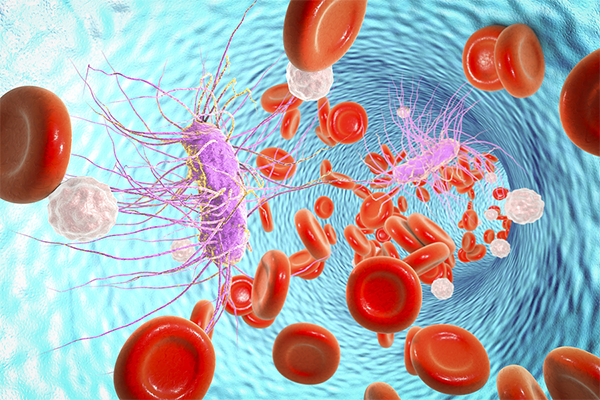Imagine an infection that spreads like wildfire through your body.
Your body reacts, hard, marching out an immune response to fight the infection. That triggers more inflammation, leading to blood clots and leaky blood vessels. Then your organs start to suffer from lack of blood flow and, if left untreated, shut down.
That’s sepsis. It’s a serious medical condition that is also the number-one reason for preventable death around the world.
“Sepsis can have a variety of causes,” said Dr. William Cagle, a pediatric intensivist in the pediatric intensive care unit at the Children’s Hospital of Georgia, but it tends to be related to an initial viral or bacterial illness, such as blood infections (bacteremia), severe urinary tract infections, meningitis or pneumonia. That’s why there’s a higher risk of sepsis in winter months.
“It can also come from something as simple as a scratch or cut in the skin, or as complex as having an infection around your heart valves,” said Cagle.
Anyone can get sepsis. But those at highest risk are:
• Babies younger than 2 months, whose immune systems are still developing
• Premature babies
• Children and adults with heart defects or heart problems, kidney problems, chronic issues, any known problem with the immune system, liver disease, diabetes, cancer or HIV
• The elderly
What to Look For
When we’re sick, we might have a fever or aches and pains.
Sepsis is fever and aches and pains on another level. Many doctors use the following to describe symptoms:
• S: Shivering, fever or very cold (small children in particular may have lower temperatures)
• E: Extreme pain or general discomfort
• P: Pale or discolored skin
• S: Sleepy, difficult to rouse, lethargic or confused (babies may seem “floppy”)
• I: “I feel like I might die.”
• S: Shortness of breath and very fast heart beat
Dehydration is another symptom, which in young children could show itself in fewer wet diapers, but in older children and adults in sunken eyes and cracked lips.
Any newborn younger than one month old who has any kind of fever should be seen by a pediatrician immediately, said Cagle. For older children and adults, it’s important to see a doctor immediately if a fever seems to take a turn for the worse and patients experience any of the above symptoms—and not try to “wait it out” over a weekend or a few days.
That’s because with sepsis, time is of the essence. “We have something called the ‘golden hour.’ As soon as a doctor recognizes sepsis, our goal is to get antibiotics in as fast as possible and get a patient rehydrated quickly,” said Cagle. “From there, we treat symptoms like fever and pain and give oxygen for respiratory support if someone’s having a hard time breathing.” For very sick patients, heart/lung bypass might be required.
And the very best treatment? “Prevention from getting sick in the first place,” said Cagle. “Wash hands, limit exposure to others who are sick and pay attention to any wounds.”
Sepsis By the Numbers
In the United States, 1.7 million people get sepsis every year, and 270,000 people die. That’s more than those who die from breast cancer, prostate cancer and AIDS, combined.
As many as 87% of all cases of sepsis start out in the community. That’s why Cagle and international experts are pushing for rapid diagnosis and treatment, since as many as 80% of all deaths related to sepsis could be prevented, if the condition was caught early.
“Absolutely, the best thing is early recognition,” said Cagle. “The longer it goes without being recognized, the more deadly it is.”





